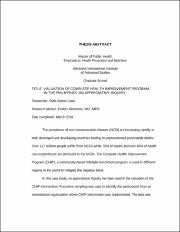Valuation of complete health improvement program in the Philippines : an appreciative inquiry
Abstract
The prevalence of non-communicable diseases (NCD) are increasing rapidly in both developed and developing countries leading to unprecedented preventable deaths. Over 117 million people suffer from NCDs while 70% of deaths and over 84% of health care expenditures are attributed to the NCDs. The Complete Health Improvement Program (CHIP), a community-based, lifestyle enrichment program, is used in different regions in the world to mitigate this negative trend.
In this case study, an appreciative inquiry has been used in the valuation of the CHIP intervention. Purposive sampling was used to identify the participants from an international organization where CHIP intervention was implemented. The data was
collected using in-depth interviews, personal journaling, researcher’s observation, and documentation.
The findings from this study suggest that most of the people who participated in the CHIP intervention had lifestyle related NCDs and were on medication. The participants experienced positive health benefits by participating and adapting the CHIP as a health intervention program. In addition, social support played a key role in sustaining the CHIP intervention. These benefits are being extended to their families and colleagues at work places and other public places by modelling the CHIP. Innovative ways of extending CHIP to a wider community has been proposed. Further, research on the CHIP using qualitative case studies may be conducted. Use of a qualitative case study will also assist the organizers to uphold the success and improve the CHIP interventions from the participants’ point of view.


